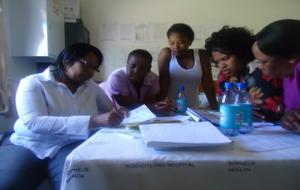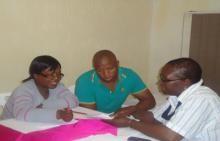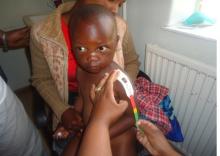Lesotho conducts Integrated Management of Childhood Illness (IMCI) and severe acute malnutrition training in all districts to strengthen health services.
The Kingdom of Lesotho received United Nations Central Emergency Response Funds (CERF) following food insecurity after severe drought in July 2012. In anticipation of severe malnutrition and other childhood illnesses, the WHO Lesotho and other UN Agencies supported the government on nationwide training of health workers in health facilities.
Integrated Management of Childhood Illness (IMCI) and Severe Acute Malnutrition training has begun to be conducted for registered nurses and nursing assistants throughout Lesotho’s ten districts. The first training was conducted in Thaba-Tseka from the 15th -26th October 2012, with participants from both Paray and St James Hospitals. The training equips the participants with skills and knowledge on how to assess, classify and treat children, from 0- 5years, on a variety of childhood illnesses and malnutrition.
The training was facilitated by IMCI focal person in the Ministry of Health, Mrs. Mathe, IMCI trainer Senior Nursing Officer from Baylor College of Medicine Children’s Foundation in Lesotho, Mrs. Mots’oari and the WHO Project Mentor, Mrs. Mpho Macheli.
Mrs. Mathe welcomed the participants who attended the training and briefly explained that IMCI aimed at reducing infant mortality through reducing the incidence and seriousness of illness and health problems that affect children as well as improving growth and development during the first five years of a child’s life.
In the first week of the training, participants were trained on treatment for various ailments such as nonspecific signs of serious illness, coughs and difficulty breathing, dehydration, persistent diarrhea, dysentery, fever, malaria and measles. All participants completed four modules.
The second week of training was mainly on practicals which were done in Paray Hospital in the out-patient department. Participants were able to access, classify, treat and refer some children to a doctor for further management. In the maternity ward, trainees assisted mothers with good positioning and good attachment with babies during breastfeeding, and in the children’s wards they observed the treatment of severely malnourished children.
Challenges facing the district, identified over the two weeks include F75 and F100 (therapeutic food) stock-outs in the hospital, which are essential for the treatment of severe malnutrition, management of severe malnourished children in the hospital was not done according to Protocol and inpatient management of severe malnutrition was suboptimal because the Nutritionist in the district was overburdened with other responsibilities.
The recommendation from the inaugural training was that better preparation needs to take place before the next stage of training. In addition, Zinc, Resomal, F75 and F100, Mid-Upper-Arm–Circumference (MUAC) tapes, Length Boards and Length for height scales need to be provided to all hospitals to ensure the smooth implementation of IMCI and cost effective management of acute malnutrition and other childhood illnesses.The next training session will take place next week in Quthing district, until all the ten districts are completed.
Lesotho conducts Integrated Management of Childhood Illness (IMCI) and severe acute malnutrition







